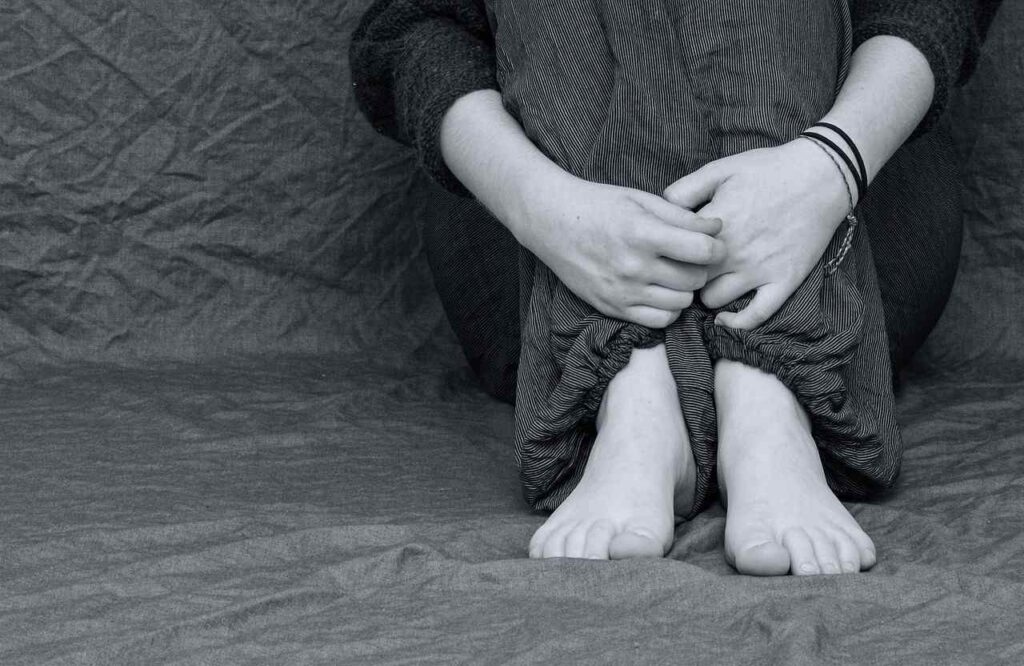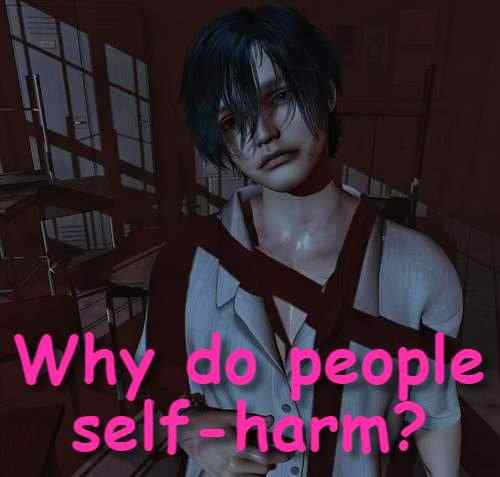Table of Contents
Self-harm is a behavior that may be difficult to understand if you’ve never experienced it. People who self-harm may do so as a way of coping with life’s difficulties and expressing emotions they find difficult to verbalize. It’s important to know that people who self-harm don’t do so to seek attention or because they want to harm themselves. Instead, it’s a way of dealing with life’s challenges.
What is self-harm?
Self-harm is when you hurt yourself on purpose. The behavior can take many forms, including cutting, burning, or even intentionally bruising oneself. Self-harm is linked to emotional pain and the urge to self-harm may be a way of dealing with difficult feelings.
Definition of self-harm behavior
Self-harm behavior is a way in which people may self-harm, with aim of coping with difficulties in their life. It can involve different methods and be carried out for different reasons and the risk of self-harming is something that should be taken seriously.
Why do people self-harm?
There are different reasons why someone may self-harm. It could be a way of dealing with emotional pain and self-harm may offer temporary relief from difficult emotions. Some people use self-harm as a way of punishing themselves, while others self-harm as a way to feel in control.
Is self-harm common?
Self-harm isn’t uncommon and people of all ages may self-harm. Young people who self-harm are most at risk, but people who have self-harmed before may be at risk of self-harming again.

How can I get help if I self-harm?
If you’re self-harming, it’s important to know that there is help and support available. Here are three ways you can ask for help:
Talk to someone you trust
Talking to someone you trust can be a good way to open up about difficult feelings. This may be a friend, family member, or someone you feel comfortable with.
Talk to your GP
Your GP can offer advice on how to stop self-harming and refer you for treatment if needed. Your GP may also be able to provide information on local support groups.
Find the right support
There are many different types of support available to people who self-harm, including counseling, therapy, and group support. Finding the type of support that works for you is important.

What should I do if someone I know self-harms?
If you know someone who self-harms, it can be difficult to know how to offer support. Here are three ways you can help:
Offer support and don't judge
Offering support and not judging the person who is self-harming can be helpful. Having someone to talk to and offer support can make a difference.
Encourage talking about thoughts and feelings
Encouraging the person who self-harms to talk about their thoughts and feelings can help them express difficult emotions in a healthier way.
Suggest professional help
Suggesting that the person who self-harms seeks professional help can also be beneficial. This may include counseling, therapy, or group support.

What causes someone to self-harm?
There are different factors that may cause someone to self-harm. Here are three possible causes:
Mental health conditions
Mental health conditions, such as depression or anxiety, can contribute to self-harm behavior. Seeking treatment for mental health conditions can help manage self-harm behavior.
Emotional pain
Self-harm may offer temporary relief from emotional pain, which can contribute to the behavior.
The urge to self-harm
The urge to self-harm can be strong and difficult to resist. Finding healthy ways to manage the urge to self-harm, such as through distraction techniques, can be helpful.

How can self-harm behavior be stopped?
Stopping self-harm behavior can be challenging but it’s important to seek help and support. Here are three ways to stop self-harm behavior:
Distraction techniques
Using distraction techniques, such as deep breathing, taking a walk, or engaging in a favorite activity, can help manage the urge to self-harm.
Getting help from a health professional
Getting help from a health professional, such as a counselor or therapist, can help you learn strategies to manage self-harm behavior.
Advice on self-harm
There is advice available on how to stop self-harm behavior and how to manage difficult emotions in healthier ways. Seeking out this advice can be beneficial.

What help is available for self-harming behavior?
There are different types of support available for self-harming behavior. Here are three examples:
NHS support
The NHS offers a range of mental health services that can support people who self-harm.
Helpline support
There are helplines available for those who self-harm, offering support and advice.
Talking to a mental health professional
Talking to a mental health professional, such as a counselor or therapist, can be beneficial in managing self-harm behavior and learning healthier ways to cope with difficult emotions. In summary, self-harm is a way in which people may cope with emotional difficulties and express emotions they find difficult to verbalize.
It’s important to know that help is available and seeking out the right support is key to managing self-harm behavior. If you know someone who self-harms, offering support and encouraging them to seek professional help can make a difference.

Frequently Asked Questions About Why Do People Self-harm
Q: Why do people self-harm?
A: Self-harm can be a way for someone to express or cope with difficult feelings or emotions, or as a way to deal with life’s difficulties.
Q: What is self-harming behavior?
A: Self-harming behavior is intentional harm to one's own body, often without the intention to end life. This behavior can take many forms, including cutting, burning, scratching, and other forms of injury.
Q: Are some people more likely to self-harm than others?
A: Yes, some people are more likely to self-harm than others, such as those who have experienced trauma or abuse, those who struggle with mental health conditions, and those who have a history of self-harming behavior.
Q: How can talking to someone help reduce self-harm?
A: Talking to someone about self-harm can be an important first step in getting help and finding support. Talking to someone you trust can also help you feel less alone and reduce the urge to self-harm.
Q: What are some distraction techniques to help someone stop self-harming?
A: Some distraction techniques that can help someone stop self-harming include deep breathing exercises, physical activity, journaling or drawing, listening to music, and reaching out to someone for support.
Q: Is self-harm caused by mental illness?
A: While self-harm can be associated with mental illness, it is not always caused by it. There may be a variety of reasons why someone engages in self-harming behavior.
Q: What is the best treatment for self-harm?
A: The best treatment for self-harm depends on the individual and their specific needs. Treatment may include therapy, medication, support groups, and other forms of treatment to help the person reduce or stop self-harming behavior.
Q: Can self-harm become addictive?
A: Yes, self-harm can become addictive for some people. The behavior can lead to a cycle of relief and then guilt or shame, which can lead to further self-harm.
Q: Do many people self-harm?
A: Yes, self-harm is more common than you might think. Many people self-harm but do not talk about it openly.
Q: How can the NHS or GP help someone who self-harms?
A: It is important to talk to your GP about self-harming behavior and the support that may be available. The NHS may be able to provide counseling or other forms of support to help someone deal with self-harm.
Q: What is self-harming behaviour?
A: Self-harming behaviour includes any intentional harm to oneself, such as cutting, burning, or hitting oneself. It is a way some people deal with emotional pain and distress.
Q: Can self harm be a cry for help?
A: Yes, sometimes people who self harm are trying to show others they are struggling and need support and help.
Q: What advice can you give to someone who self harms?
A: Seek professional help, talk to your GP, and know that you're not alone. There is support and help available for you to overcome this behaviour.
Q: How can I help someone I know who self harms?
A: Be there for them and try to understand their reasons for self-harm. Encourage them to seek professional help and support them through the process of trying to stop self-harming behaviour.
Q: Is it difficult for people to stop self harming?
A: Yes, it can be very difficult to stop self-harming behaviour, especially if it has become a coping mechanism for dealing with difficult emotions. With the right support, however, it is possible to stop self-harming.
Q: What are some signs of low self-esteem that might lead to self-harm?
A: Feeling numb, not feeling in control of one's life, feeling like they can't do anything right, and a lack of self-worth are all signs that someone might not be feeling good about themselves, and could lead to self-harm as a way to cope.
Q: What should I do if I feel the urge to self-harm?
A: Reach out for help and support. Talk to someone you trust about your feelings, distract yourself with activities you enjoy, and seek professional help.
Q: What causes self-harm?
A: Self-harm is usually caused by a combination of factors, including mental health issues, traumatic life experiences, and feeling overwhelmed by difficult emotions.
Q: When should I talk to a trained mental health professional?
A: As soon as possible. Mental health professionals can provide the right support and advice on self-harm, and help you work through the reasons for your self-harming behaviour. Know who to turn to for help.
Related Articles
NHS Why do people self-harm?
Mind Why do people self-harm?
YouTube Why do people self-harm?
https://www.youtube.com/watch?v=u-c0WqpAp_4
Suicide Line Why do people self-harm?
https://suicideline.org.au/concerned-about-someone/why-do-people-self-harm/
The Mix Why do people self-harm?
https://www.themix.org.uk/mental-health/self-harm/why-do-people-self-harm-5680.html
Life Skill Why do people self-harm?
https://www.lifeskillssouthflorida.com/mental-health-blog/why-do-people-self-harm/
Spun Out Why do people self-harm?
https://spunout.ie/mental-health/self-harm/why-people-self-harm
Ibiza Calm Why do people self-harm?
https://ibizacalm.com/why-do-people-self-harm/
The Guardian Why do people self-harm?
https://www.theguardian.com/commentisfree/2017/sep/06/google-autocomplete-why-people-self-harm
Hey Sigmund Why do people self-harm?
https://www.heysigmund.com/why-do-people-self-harm/
Jigsaw Why do people self-harm?
Meducate Training Why do people self-harm?
https://www.meducatetraining.co.uk/blog/why-do-people-self-harm/
Nerd Momma Why Am I So Angry?
https://nerdmomma.com/why-am-i-so-angry-big-20-angry-all-the-time-faqs/#more-3497
Nerd Momma Why Does My Chest Hurt?
https://nerdmomma.com/why-does-my-chest-hurt-20-get-chest-pain-faqs/#more-3506
